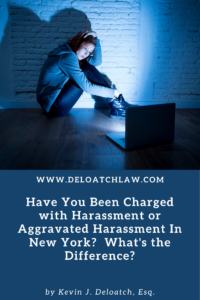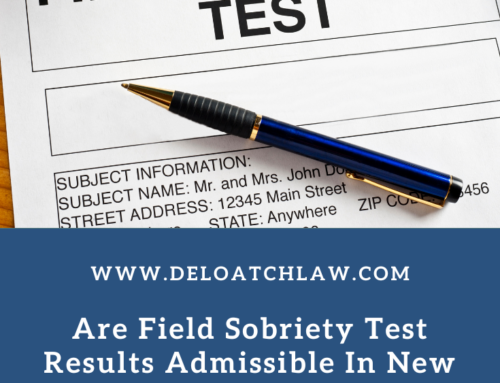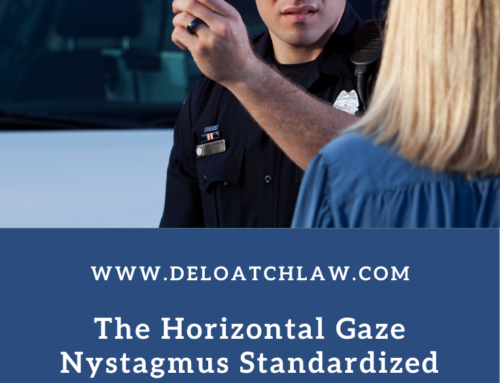Have you been arrested and charged with the crimes of harassment or aggravated harassment in New York? If you have, one of the most, if not the most important decisions you will have to make is obtaining good legal counsel. Indeed, your immediate and long-term future depends on it.
What Exactly are Harassment and Aggravated Harassment?
The crimes of harassment and aggravated harassment are serious offenses under New York law. They are defined in New York under Penal Law (PL) § 240 and broken up into four sections. In fact, the crime of aggravated harassment involves the crime(s) of harassment, as defined under sections PL § 240.25 (harassment in the first degree) and PL § 240.26 (harassment in the second degree) but extends them to very specific circumstances. Thus, it is necessary to first understand the crime(s) of harassment before jumping to aggravated harassment.
A. Harassment (PL § 240.25 and PL 240.26)
Under NY PL § 240.25, a person is guilty harassment in the first degree when they:
Intentionally and repeatedly harass another person by following such person in or about a public place or places or by engaging in a course of conduct or by repeatedly committing acts which places such person in reasonable fear of physical injury.
Harassment in the first degree is a Class B misdemeanor. If convicted, a person faces a maximum term of incarceration of three months in jail.
However, under PL § 240.26, a person is guilty of harassment in the second degree when with intent to harass, annoy, or alarm another person, they:
- strike, shove, kick or otherwise subjects such other person to physical contact, or attempts or threatens to do the same; or
- follow such other person in a public place; or
- engage in a course of conduct or repeatedly commits acts which alarm or seriously annoy such other person, and which serve no legitimate purpose.
Harassment in the second degree is a violation, as opposed to a crime (i.e., a felony or misdemeanor). However, if convicted, a person can still go to jail for up to 15 days.
Although there are many elements to both PL § 240.25 and PL § 240.26, it’s clear that they apply to offensive conduct directed at a person primarily while in a public place or setting.
B. Aggravated Harassment (PL § 240.30 and PL 240.31)
Unlike harassment under either PL § 240.25 or PL § 240.26, aggravated harassment under PL § 240.30 and PL § 240.31 add very specific actions by the perpetrator, that make the crime more offensive (i.e., aggravating circumstances).
For example, if the perpetrator targets someone because of their constitutionally protected characteristics (e.g., race, religion, gender…etc.) or uses some means of communication to commit the crime (e.g., telephone, computer, mail …etc.) they will have committed the crime of aggravated harassment.
-
-
Aggravated Harassment in the Second Degree (PL § 240.30)
-
Specifically, aggravated harassment in the second degree under PL § 240.30 includes the following actions of the perpetrator in addition to the intent to harass:
- communication or the causing of a communication of a threat of physical harm by telephone, computer, mail …or any other form of communication to a person, or the property of a person, or a member of the person’s family or household; or
- making a phone call whether or not a conversation ensues; or
- threatening or alarming a person or subject them to physical contact because of a belief or perception of their “race, color, national origin, ancestry, gender, gender identity or expression, religion, religious practice, age, disability or sexual orientation”; or
- subjecting another person (or family/household member of the person) to physical contact causing injury to that person; or
- committing the crime of harassment in the first degree (i.e., PL § 240.25) while having previously been convicted of harassment in the first degree.
Aggravated harassment in the second degree is a Class A misdemeanor. If convicted, a person faces a maximum term of incarceration of one year.
-
-
Aggravated Harassment in the First Degree (PL § 240.31)
-
While aggravated harassment in the second degree (PL § 240.30) primarily addresses the perpetrator’s use of a means of communicating the threat, aggravated harassment in the first degree under PL § 240.31 specifically addresses actions of the perpetrator that are taken because of a belief or perception of the victim’s constitutionally protected characteristics (i.e., race, religion, gender…etc.).
Specifically, it addresses the following:
- Damages premises primarily used for religious purposes, or acquired pursuant to section six of the religious corporation law and maintained for purposes of religious instruction, and the damage to the premises exceeds fifty dollars; or
- Etches, paints, draws upon or otherwise places a swastika, commonly exhibited as the emblem of Nazi Germany, on any building or other real property, public or private, owned by any person, firm or corporation or any public agency or instrumentality, without express permission of the owner or operator of such building or real property; or
- Sets on fire a cross in public view; or
- Etches, paints, draws upon or otherwise places or displays a noose, commonly exhibited as a symbol of racism and intimidation, on any building or other real property, public or private, owned by any person, firm or corporation or any public agency or instrumentality, without express permission of the owner or operator of such building or real property.
PL § 240.31(2) also makes clear that a person is guilty of aggravated harassment in the first degree if they have previously been convicted of aggravated harassment in the second degree under subdivision three (i.e., striking, shoving, kicking or other physical contact) or if they have previously been convicted of aggravated harassment in the first degree in the preceding five years.
Aggravated harassment in the first degree in New York is a Class E felony. If convicted, a person faces a maximum term of incarceration of four years.
Hiring a Criminal Defense Attorney
If you or someone you know has been charged with either harassment or aggravated harassment in New York call the Law Office of Kevin J. Deloatch, Esq. at (646) 792-2156. The results of all criminal prosecutions are determined by the facts and circumstances of your specific case and the skill and experience of your criminal defense attorney. The Law Office of Kevin J. Deloatch, Esq. has an extensive criminal law practice including over 20 years of criminal defense experience and over 30 years on Wall Street. Call today for a free consultation.








